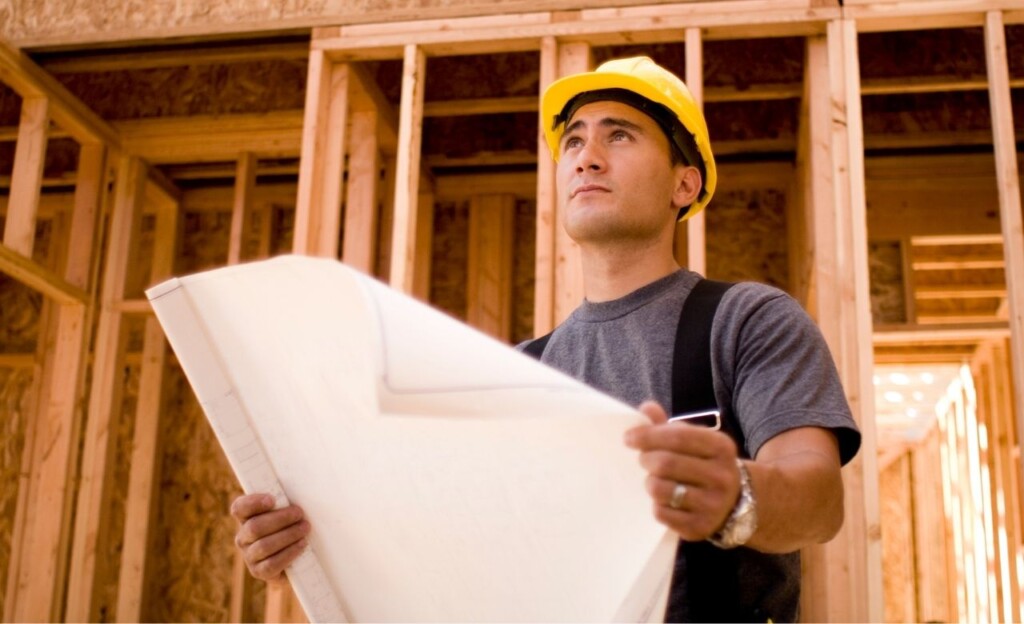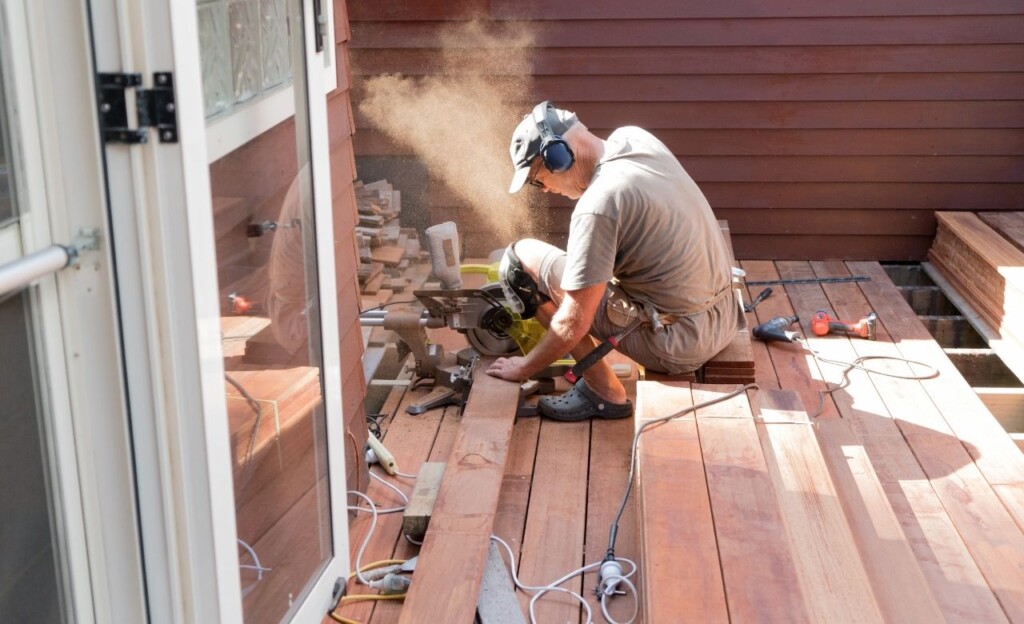You don’t want to hire the wrong person to build your deck. There are far too many things that can go wrong by hiring unqualified deck builders or having your handyman build the deck. Risks include both cost overruns and safety concerns. In this article we are going to talk about the most common red flags you may run into when collecting new deck estimates.
The Research Triangle area has seen rapid growth recently. This boom has attracted skilled professionals but also shady contractors looking to cash in on the growth. With many options in Raleigh, Durham, Cary, and nearby communities, it’s tough to find the right deck builder.
The Triangle market poses unique challenges that need local know-how. Navigating different permits in Wake and Durham counties is just one part. Understanding how North Carolina’s clay soil and humid climate affect deck building is important if you care about durability. A deck made by someone who doesn’t know these conditions might seem fine at first. But it could face big issues much sooner than expected.
Here’s what to watch for when choosing deck builders in the Research Triangle area.
Red Flag #1: No Local References or Portfolio

One of the most obvious warning signs you can spot is a lack of local references or portfolio of work. If they are experienced elsewhere it’s not the same as here. And if customers won’t speak on their behalf then it’s not someone you want to work with. Their recent projects should be in the Triangle or references from neighbors in Raleigh, Durham, Cary, or nearby areas.
Don’t fall for stock photos. Those are some of the easiest to spot as they are often immaulate beyond what a normal fence should look like. Same with ones generated with AI – the details are often slightly off. We have seen companies use other company’s photos to mask their lack of experience – so ask about the details of each project and trust your gut. Without real local references, you can’t confirm their skills or reliability.
Let me give you an example for why hiring local, especially in the Triangle is important. For one, ther permitting requirement are tricky. Also, we have a lot of red clay in our area – if the posts are not set properly to account for how the clay acts differently in rain or dry you could be in trouble as it settles. The humid subtropical climate requires careful material choices and good ventilation to prevent moisture and mold issues.
There are further benefits for the home owner when it comes to warranty and quality issues. If they are local you can find them again to come fix it. If you hired someone from the shadows they will return to the shadows when you need them.
Red Flag #2: Significantly Low Bids – Too Good to Be True

We’ve all heard the saying, “if it sounds too good to be true, it probably is.” This is especially true for deck construction bids. If you get a quote that’s much lower than others—say, 30% or more below average—be very cautious before accepting. While everyone likes a deal, extremely low bids often mean something is missing, being unsaid, or the materials may not be up to snuff.
Low-ball contractors usually get their low prices through questionable methods. They might use cheap materials that seem fine but quickly wear out in North Carolina’s weather. Instead of pressure-treated lumber rated for ground contact, they might use untreated wood that rots in a few years. They might skip stainless steel or galvanized fasteners. Instead, they could use regular screws. These screws won’t hold up and will leave rust stains after just one winter.
Labor costs are another area where dishonest contractors like to save. They hire inexperienced workers who can’t install joists, beams, and decking boards correctly. Poor installation can lead to squeaky boards, uneven surfaces, and even dangerous failures.
The hidden costs are often hidden in the insurance. Many low-ball contractors skip insurance. Anything that happens on your property leaves you liable. They might skip permit applications to save time and money, which could create legal issues when you try to sell your home. The worst ones present a low cost to start and then hit you with change orders during the project as if your should have known.
Quality deck construction requires investing in good materials and skilled labor. Reputable contractors give clear, detailed quotes. These show what materials will be used and what work will be done. They explain why certain materials and techniques cost more but offer better long-term results. While their bids may not be the lowest, they reflect fair pricing for lasting work.
Some contractors trust their pricing. They offer price match guarantees for valid, written bids from licensed competitors, like AAA Fence & Deck. This shows their commitment to fair pricing while ensuring you don’t sacrifice quality for a lower price.
Red Flag #3: Pushy Sales Tactics and Door-to-Door Approaches

If someone knocks on your door claiming to be a deck contractor with leftover materials, be cautious. They might offer you a “special deal” if you sign today. This high-pressure tactic is rarely from reliable contractors. Good deck builders don’t need to knock on doors; their reputation keeps them busy.
Pushy sales tactics come in many forms. They all aim to rush your decision. Some contractors might say their “special pricing” ends during the visit, creating urgency to pressure you. Others may claim they have “leftover materials” from another job to offer a steep discount. In truth, they may just want to unload poor-quality materials.
Red Flag #4: No Proper Licensing, Insurance, or Bonding Documentation

Not enough homeowners check on the licensing and insurance of their contractors. In the search for lowest price it is wild what many homeowners will turn a blind eye towards. It is so risky to have a contractor at your house without insurance. A single injury can bankrupt you as your the liable party for all injuries. You need protection when someone works on your property, especially for major projects like deck construction.
Here are the rules in North Carolina for licensing. In North Carolina, contractors doing work over $30,000 must be licensed by the state. Even for smaller projects, using licensed contractors is still important.
Insurance is crucial and non-negotiable. General liability insurance protects you if the contractor damages your property while on-site. For example, if heavy equipment breaks a gas line or harms your home’s siding, this insurance comes into play. Workers’ compensation protects you if a worker gets injured on your property. Without it, you could be liable for medical bills and lost wages, which can add up quickly.
Verifying credentials is straightforward but requires some effort. Ask for current insurance certificates and confirm them directly with the insurance company. Check contractor licenses on the North Carolina licensing board’s website.
Established contractors often exceed basic requirements. They might have A+ ratings from the Better Business Bureau. They could also be members of professional groups like the American Fence Association or local chambers of commerce.
Red Flag #5: Can’t Explain Local Building Code Requirements

One of the easiest ways to know if the contractor is a pro or not is to do a little research yourself on local regulations and then ask the contractor about it when they are at your house. If they can’t recite the rules then you know it’s not a legitimate company. If they roll their eyes and say “don’t worry about permits” or call them “just another government money grab,” walk away. Fast.
This attitude screams inexperience and incompetence. Or worse—they know the rules but plan to ignore them anyway. Either way, you’re the one who’ll pay the price later.
Building codes exist for a reason. People got hurt when structures weren’t built right. Property gets damage. So now we have rules. In the Triangle, you’ve got North Carolina state codes plus whatever your specific city decides to throw at you. Raleigh has different requirements than Durham. Cary does things a bit different than Wake Forest. A good contractor knows this stuff cold.
They should be able to explain why deck posts need concrete footings below the frost line. (Yes, North Carolina has a frost line.) They’ll know that most decking requires joists spaced 16 inches on center, but composite materials might need tighter spacing. If a deck or raised platform is 30 inches or more above the adjacent grade, it needs guardrails at least 36 inches high. Open sides of stairs with a total rise over 30 inches need guardrails, and handrails if there are 4 or more risers. Balusters / openings must be such that a 4-inch sphere cannot pass through. Handrails must be 34-38 inches high (for stairs) from the nosing.
Live in a neighborhood with an HOA? That’s another layer of fun. The committee usually has an opinion about your deck color, materials, and design that should be accounted for.
Professional contractors handle permits easily because for them, it isn’t. They know which projects need permits in which precincts. They’ve filled out the applications a hundred times. They have relationships with building officials and know how long approvals typically take. Most importantly? They’re not scared of inspections because their work passes. That’s why homeowners love companies like AAA – we’ve seen it all so your project is going to be seamless.
Green Flags: What Quality Triangle Deck Builders Look Like

Here are some positive signs that show you’re working with a trustworthy deck contractor:
- They have good reviews from past clients.
- They offer detailed estimates without hidden fees.
- They are licensed and insured.
- They communicate clearly and promptly.
- They have a strong portfolio of completed projects.
These “green flags” show the opposite of what we’ve talked about. They can boost your confidence that you’re making the right investment choice.
They’ve been around forever. Good contractors don’t just show up yesterday. They’ve got real offices you can visit, not just a phone number. If they’ve lasted decades in the Triangle, they’re doing something right.
They have their paperwork in order. License, insurance, certifications—all there. They don’t make excuses about missing documents or promise to get them later.
They use good stuff. Quality materials from suppliers they trust. They’ll tell you why they pick certain lumber or fasteners without making it sound complicated.
They don’t pressure you. Free consultation, clear pricing, no rush to sign. Some even match other legitimate bids because they’re confident in their value.
They fix problems. Real warranties backed by companies that actually answer the phone when you call. If something goes wrong, they show up to make it right.
Making the Right Choice: Questions to Ask Potential Contractors

Now you know what to look for. Time to start asking questions.
Ask to see their work. “Show me recent decks you’ve built around here.” If they can’t, keep looking.
Get references. “Can I talk to three customers from this year?” Good contractors hand these over without hesitation.
Ask about materials. “What lumber do you use and why?” They should explain their choices in plain English.
Check their paperwork. “Are you licensed and insured? Can I see proof?” No excuses, no delays.
Talk timelines. “How long will this take? What happens if it rains?” Realistic contractors plan for weather delays.
Understand the warranty. “What’s covered if something goes wrong?” Good contractors explain this clearly and give examples.
Watch how they answer. Do they seem nervous? Evasive? Pushy? Trust your gut.
Ready to talk to a contractor who checks all these boxes? AAA Fence and Deck has been building quality decks in the Triangle for over 30 years. They handle permits, use premium materials, and back their work with solid warranties. Call 984-333-5313 for your free consultation and see why they’re Raleigh’s most trusted deck builders.
